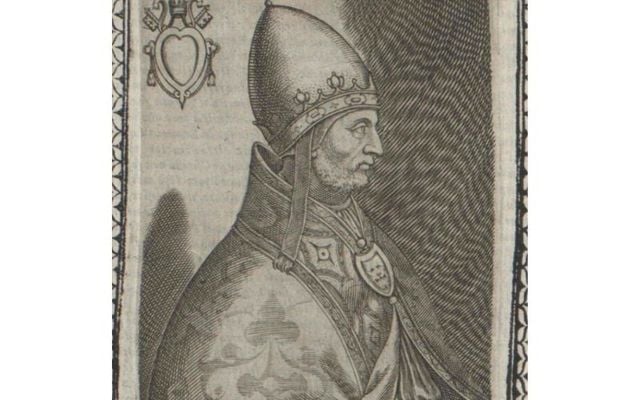Pope Adrian IV is known for issuing the “Laudabiliter” or as it is better known “Bull,” which gave Henry II the Pope’s permission to invade Ireland “for the correction of morals and the introduction of virtues, for the advancement of the Christian religion.” The Papal Bull became the most well-known and controversial part of the pope’s legacy.
Born near St. Albans in England around 1100, Nicholas Breakspear. as he was originally known. went to France at an early age for his studies. There he took the vows and habit of an Austin canon. He was later elected abbot and made a cardinal by Pope Eugenius III when business regarding the monastery took him to Rome. In 1152 Nicholas was sent as a papal legate on a mission to Scandinavia, where he established an independent archiepiscopal see.
When he returned to Rome he was hailed as the Apostle of the North. Soon after Pope Anastasius died in December of 1153 and the cardinals unanimously made Nicholas the next pope, the only English-born pope to date.

Love Irish history? Share your favorite stories with other history buffs in the IrishCentral History Facebook group.
The early years of Adrian IV’s papacy were fraught with conflict and power struggles. King Henry II petitioned the new pope for a papal Bull, but Adrian IV did not issue it for some years. When Adrian IV refused to recognize William I of Sicily in 1154, William I responded by laying siege to the papal possession of Beneventum. Adrian IV excommunicated him and his vassals marched on Beneventum, where he stayed until 1156.
During that year, Adrian IV issued the Bull. Scholars debate whether an Italian-born pope would have given Henry permission or whether Henry would have invaded Ireland even without a papal Bull. Some scholars suggest that Adrian IV believed Henry would invade regardless and issued the Bull so the Church would end up on the winning side.
The Bull is erroneously believed to have given Henry a carte blanche to conquer Ireland. Adrian wrote that Henry was to respect the Church in Ireland. In translation from The Wild Geese, the Bull states, “And may the people of that land receive thee with honor, and venerate thee as their master: provided always that the rights of the churches remain inviolate and entire, and saving to St. Peter and the holy Roman Church the annual pension of one penny from each house.”
Later English monarchs would violate this part.
When Adrian IV issued the Bull in 1156, Henry II was not in a position to invade Ireland. Henry was occupied with subduing the Welsh abroad and subduing Archbishop of Canterbury Thomas Becket at home. During that year, Henry proposed giving the job of subduing Ireland to his brother, William, but this idea was not pleasing to his mother Matilda, whose opinion carried considerable weight, and the expedition was postponed.
Ireland at this time was flourishing in the arts. The monastery Columbia had founded in Durrow, Co Laois in the sixth century taught students from a diverse geographical backgrounds by the seventh century. Irish students boasted achievements in architecture, astronomy, and science. The Normans never fully conquered Ireland; they intermarried and adopted Irish law, manners, and language and became “more Irish than the Irish themselves.”
In Italy, Adrian IV agreed to invest William with the crowns of Sicily and Apulia and William became the liegeman of the pope and agreed to defend papal territories. Adrian IV returned to Rome in 1157. Since the pope had given to William I lands, which Emperor Frederick claimed to possess, conflict broke out between Frederick and Adrian IV for this and other reasons. Still in the midst of conflict, Adrian IV died in Anagni in 1159, possibly from a tonsillitis infection.
Adrian IV did not see the impact of the Bull during his lifetime. It was not until 1166 when Henry sent over Anglo-Norman soldiers in answer to Dermot MacMurrough, King of Leinster request for help retaking his kingdom that soldiers invaded Ireland. It was the invasions of Henry VIII and Elizabeth I that led to the end of the old Gaelic order in Ireland.




Comments